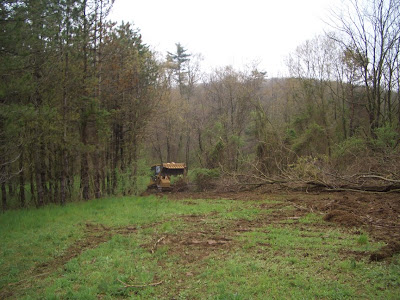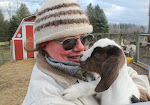 Well, I wouldn't exactly call the steers & calves 'old', but it was time for them to take a trip to see Mr. Horst, our USDA-certified butcher approximately 45 minutes from the farm. It's never an easy task, but it's a fact of life whenever a farmer raises livestock for meat. While there are a few USDA butchers closer to the farm, I prefer to take my animals to Horsts' because they do an excellent job at cutting & packaging. Rarely do any of their vacuum-sealed packages come unsealed. But most importantly, they provide a clean and low-stress holding environment. The animals have access to water and are not kept in over-crowded pens. No downer cows, no abuse, no filth. Because they limit the number of animals they slaughter in a given week, Horsts can devote the care needed to minimize the possibility for contamination.
Well, I wouldn't exactly call the steers & calves 'old', but it was time for them to take a trip to see Mr. Horst, our USDA-certified butcher approximately 45 minutes from the farm. It's never an easy task, but it's a fact of life whenever a farmer raises livestock for meat. While there are a few USDA butchers closer to the farm, I prefer to take my animals to Horsts' because they do an excellent job at cutting & packaging. Rarely do any of their vacuum-sealed packages come unsealed. But most importantly, they provide a clean and low-stress holding environment. The animals have access to water and are not kept in over-crowded pens. No downer cows, no abuse, no filth. Because they limit the number of animals they slaughter in a given week, Horsts can devote the care needed to minimize the possibility for contamination.  We can thank Horsts for maintaining our level of quality in the products we deliver to our customers.
We can thank Horsts for maintaining our level of quality in the products we deliver to our customers.  I think I'll dig up some fresh horseradish to go along with our grass-fed steaks.
I think I'll dig up some fresh horseradish to go along with our grass-fed steaks. 
Phyllis plays Queen of the Stump.

This is Emma's calf, Grayling. She's getting so big. Don't worry, Gray. Be a good girl and you won't end up at Mr. Horst's.

No matter how good any of these guys are, though, they're going to be someone's dinner eventually. Until then, they'll live the good life.
 And speaking of the good life, the next batch of veal calves is already here. The truth is if you eat ice cream, drink milk, use butter or any type of dairy product, you're contributing to the veal industry. They can't all be bulls or beef, especially the Jerseys. They are a by-product of the dairy industry. Since practically all veal operations only use large-breed dairy calves for veal since they grow faster, smaller breeds are often worthless on a commercial level. Instead of living three or four months in cramped boxes, fed a slurry of powered bone meal, milk and antibiotics and injected with synthetic estrogen, our calves have room to run and are fed a mixture of skim milk and buttermilk with some added organic 'milk only' replacer and grass hay or pasture. Sure, the meat is a little pinker than that pale, gelatinous goo tasting of little more than the sauce in which it is cooked which is currently sold as veal, but when you toss one of our veal chops on the grill it's going to end up tasting good without any help from breading or sauces.
And speaking of the good life, the next batch of veal calves is already here. The truth is if you eat ice cream, drink milk, use butter or any type of dairy product, you're contributing to the veal industry. They can't all be bulls or beef, especially the Jerseys. They are a by-product of the dairy industry. Since practically all veal operations only use large-breed dairy calves for veal since they grow faster, smaller breeds are often worthless on a commercial level. Instead of living three or four months in cramped boxes, fed a slurry of powered bone meal, milk and antibiotics and injected with synthetic estrogen, our calves have room to run and are fed a mixture of skim milk and buttermilk with some added organic 'milk only' replacer and grass hay or pasture. Sure, the meat is a little pinker than that pale, gelatinous goo tasting of little more than the sauce in which it is cooked which is currently sold as veal, but when you toss one of our veal chops on the grill it's going to end up tasting good without any help from breading or sauces.  For people who love good veal, but don't want to eat it because of all the horror stories they've been told by the animal rights activists, remember this picture.
For people who love good veal, but don't want to eat it because of all the horror stories they've been told by the animal rights activists, remember this picture.
 Ralph is already making plans to fix all the little things and then install a dump kit for the bed. It's already hinged so it just needs the cylinder and the lift kit. Also in the image, you'll notice another set of portable shelters. The multi-colored siding came from a neighbor's bone pile after he completed some roof & shed work. The short pieces worked perfect for us.
Ralph is already making plans to fix all the little things and then install a dump kit for the bed. It's already hinged so it just needs the cylinder and the lift kit. Also in the image, you'll notice another set of portable shelters. The multi-colored siding came from a neighbor's bone pile after he completed some roof & shed work. The short pieces worked perfect for us.  He already put it to use when he picked up a free work counter with cabinets from a pizza shop that went out of business. It was 9'x4'x3' and will be perfect for the creamery.
He already put it to use when he picked up a free work counter with cabinets from a pizza shop that went out of business. It was 9'x4'x3' and will be perfect for the creamery.  I see a lot of farmers driving around in their $50K pick up trucks and you know what...either their spouse works full time off the farm or they're in debt up to their eyeballs. The last thing I want is a $400+ monthly vehicle payment plus the cost of insurance that goes along with it. Anyone who says they can't afford to farm, I say "hogwash"! There's plenty of opportunity and free stuff out there as long as you aren't hung up on pretty & perfect.
I see a lot of farmers driving around in their $50K pick up trucks and you know what...either their spouse works full time off the farm or they're in debt up to their eyeballs. The last thing I want is a $400+ monthly vehicle payment plus the cost of insurance that goes along with it. Anyone who says they can't afford to farm, I say "hogwash"! There's plenty of opportunity and free stuff out there as long as you aren't hung up on pretty & perfect.


































